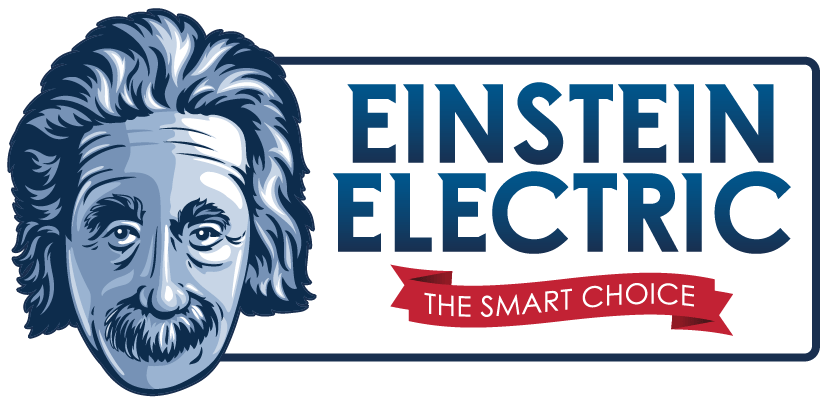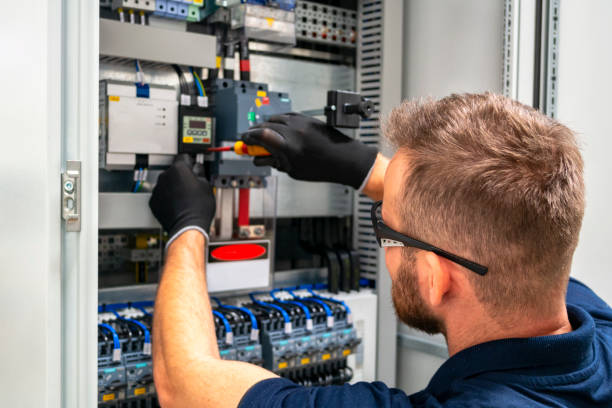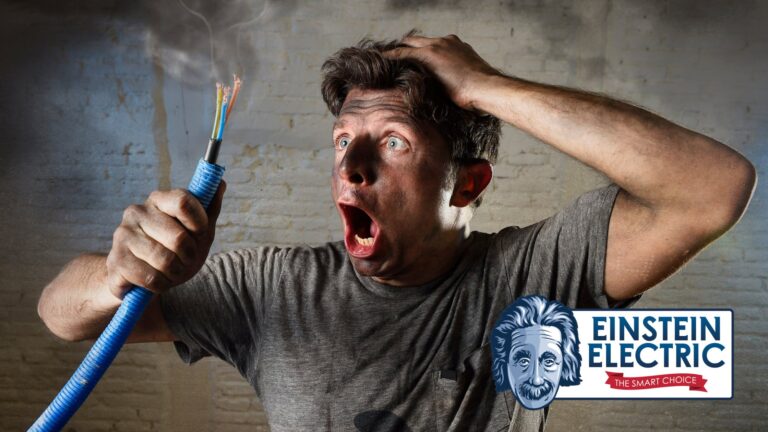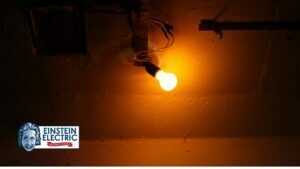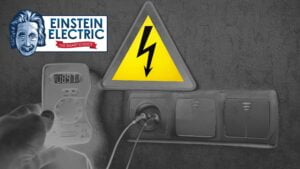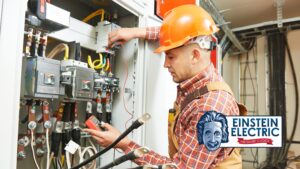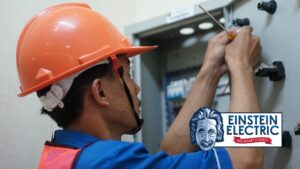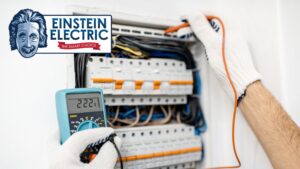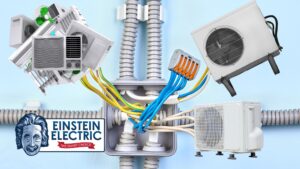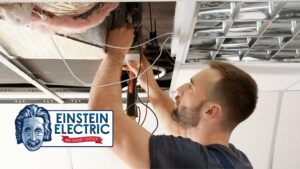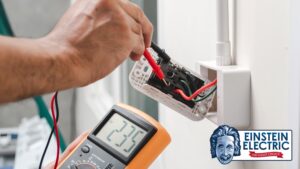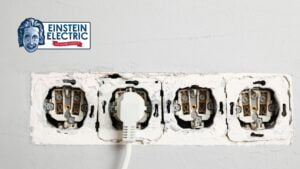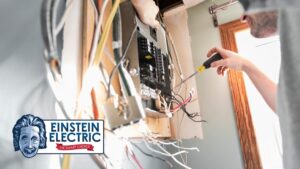Introduction
In today’s do-it-yourself (DIY) era, many people attempt various home improvement projects to save money and gain a sense of accomplishment. However, when it comes to electrical work, the risks far outweigh any potential benefits. Electrical systems are complex and dangerous, and even a minor mistake can have severe consequences. This blog explores the dangers of DIY electrical work and highlights the crucial reasons why hiring a professional electrician is always the wisest choice.
Electrical Hazards and Safety
Working with electricity poses inherent dangers. A lack of knowledge and experience in electrical systems can result in electric shock, burns, or even electrocution. Electrical wiring carries high voltage, and a single wrong move can lead to disastrous outcomes. Licensed electricians undergo rigorous training, understand safety protocols, and possess the necessary equipment to protect themselves and others from electrical hazards.
Electric shock is one of the primary dangers associated with working on electrical systems. It occurs when a person comes into contact with an energized conductor or circuit. The severity of the shock depends on factors such as the voltage, the current’s path through the body, and the duration of exposure. Even a small amount of current can disrupt the body’s electrical signals, leading to muscle contractions, burns, and potentially fatal consequences. It is vital to always assume that all electrical sources are live and take appropriate precautions to avoid electric shock.
Electrocution refers to death caused by electric shock. When a high amount of electrical current passes through the body, it can disrupt the normal functioning of the heart or other vital organs. Electrocution can occur when proper safety measures are not followed, or when individuals attempt electrical work without the necessary expertise and knowledge. It is crucial to understand that even seemingly harmless tasks can carry the risk of electrocution if not executed properly.
In addition to electric shock and electrocution, electrical work poses the risk of burns. Direct contact with live electrical components or faulty wiring can cause thermal burns. Electrical arcs, which are luminous discharges of electrical energy, can also cause severe burns or ignite nearby flammable materials. Proper insulation, protection, and appropriate handling of electrical components are crucial to minimize the risk of burns.
Moreover, electrical fires are a significant hazard associated with improper electrical installations or faulty wiring. Faulty electrical connections, overloaded circuits, or inadequate insulation can generate excessive heat, leading to electrical fires. These fires can spread quickly and cause extensive damage to property and endanger lives. It is essential to follow electrical codes and safety standards to ensure proper wiring, grounding, and circuit protection, reducing the risk of electrical fires.
To mitigate electrical hazards and ensure safety, several key safety measures should be followed. First and foremost, individuals should have a solid understanding of electrical systems or consult a professional electrician for complex tasks. It is important to use appropriate personal protective equipment (PPE), such as insulated gloves, goggles, and non-conductive footwear, to minimize the risk of electric shock and burns. Turning off the power supply at the circuit breaker before working on electrical systems is a crucial step to prevent accidental contact with live wires.
Furthermore, adherence to electrical codes and regulations is essential. These codes ensure that electrical installations are done safely and effectively, reducing the risk of electrical hazards. Following proper installation procedures, using quality materials, and avoiding shortcuts are critical to maintaining electrical safety.
Electrical hazards can have severe consequences, including electric shock, burns, and electrical fires. DIY electrical work should only be attempted by individuals with the necessary knowledge, expertise, and safety precautions. When in doubt, it is always safer to hire a licensed electrician who understands the complexities of electrical systems and can ensure the work is done safely and in compliance with electrical codes. Prioritizing electrical safety not only protects individuals from harm but also safeguards property and promotes a secure living environment.
Fire Hazards
Improper electrical work is one of the leading causes of house fires. Faulty wiring, incorrect installations, or overloaded circuits can result in electrical sparks, short circuits, and overheating, all of which can quickly ignite a fire. Electricians are trained to assess electrical systems, identify potential fire hazards, and ensure that installations adhere to safety codes, significantly reducing the risk of fires caused by electrical faults.
Faulty wiring is one of the primary causes of electrical fires. Wires that are frayed, damaged, or improperly connected can create resistance, leading to excessive heat buildup. Over time, this heat can ignite surrounding materials and result in a fire. It is essential to ensure that wiring is correctly installed, insulated, and free from any damage or wear.
Incorrect installations can also contribute to fire hazards. When electrical components, such as outlets, switches, or fixtures, are not installed properly, they may become loose or exposed. Loose connections can generate heat and increase the risk of sparking, which can easily ignite nearby flammable materials. It is crucial to follow the manufacturer’s instructions and adhere to electrical codes when installing electrical components.
Overloaded circuits are another common fire hazard. Overloading occurs when too many devices or appliances are connected to a single circuit, exceeding its capacity. The excessive current flowing through the circuit can cause overheating, leading to potential fire risks. It is important to distribute the electrical load across multiple circuits and use circuit breakers or fuses rated for the appropriate amperage to prevent overloading.
Electrical sparks are a significant warning sign of potential fire hazards. Sparks can occur due to faulty connections, damaged wires, or loose terminals. When sparks come into contact with flammable materials, they can quickly ignite and start a fire. Regular inspection of electrical components and wiring can help identify and rectify any issues before they escalate into fire hazards.
Short circuits pose a serious fire risk as well. A short circuit occurs when the current bypasses its intended path and takes a direct route from the supply to the ground. This can happen due to damaged insulation, crossed wires, or faulty electrical equipment. Short circuits can result in a sudden surge of current, generating significant heat and causing fires. Proper insulation, regular maintenance, and prompt identification of any short circuit issues are essential in preventing fire hazards.
Licensed electricians are trained to assess electrical systems and identify potential fire hazards. They have the expertise to ensure that installations meet safety codes and regulations. By hiring a professional electrician, you can significantly reduce the risk of fires caused by electrical faults. Electricians can conduct thorough inspections, address any wiring issues, and provide recommendations to enhance the safety of your electrical system.
Fire hazards are a critical concern when it comes to electrical work. Faulty wiring, incorrect installations, overloaded circuits, electrical sparks, and short circuits can all lead to devastating fires. It is essential to prioritize electrical safety, follow proper installation procedures, and have regular inspections by professional electricians. By addressing fire hazards and maintaining a safe electrical system, you can protect your property, loved ones, and ensure peace of mind.
Legal Compliance and Insurance
Electrical work is subject to strict building codes and regulations established to ensure safety. When homeowners undertake DIY electrical projects, they often overlook these regulations, risking non-compliance. If an electrical fire or accident occurs due to faulty DIY work, insurance companies may refuse to cover the damages. Hiring a licensed electrician guarantees compliance with legal requirements, minimizing liability issues and protecting your property and loved ones.
When homeowners undertake DIY electrical projects, they often overlook or underestimate the importance of these regulations. In their eagerness to save money or tackle the project themselves, they may neglect to acquire the necessary permits, follow proper wiring techniques, or adhere to safety standards. This lack of compliance puts them at risk of facing serious consequences.
Non-compliance with building codes and regulations can have various negative outcomes. One significant concern is the increased risk of electrical fires and accidents. Improperly installed or faulty electrical systems are more likely to experience short circuits, overheating, or other failures that can lead to fires or electrical shock incidents. By disregarding the regulations, homeowners are jeopardizing the safety of their property and their loved ones.
In addition to the potential safety risks, non-compliant DIY electrical work can have severe financial implications. If an electrical fire or accident occurs due to faulty DIY work, insurance companies may refuse to cover the damages. Insurance policies often require that all electrical work is carried out by licensed professionals to ensure compliance with regulations. Therefore, if a fire or accident is caused by the homeowner’s non-compliant DIY electrical work, it can result in significant financial losses.
Furthermore, liability issues arise when non-compliant electrical work leads to injuries or damages to third parties. If someone is harmed or their property is damaged due to the homeowner’s negligence in adhering to building codes and regulations, the homeowner may be held legally responsible for the consequences. This can result in costly legal battles, medical expenses, and compensation claims.
Hiring a licensed electrician is the best way to guarantee compliance with legal requirements and minimize liability issues. Licensed electricians undergo extensive training, have the necessary knowledge of building codes and regulations, and are well-versed in safety protocols. They are equipped to handle electrical installations, wiring, and repairs in a way that adheres to the established standards. By engaging a licensed electrician, homeowners can ensure that their electrical work meets all legal requirements, reducing the risk of accidents, fires, and non-compliance-related complications.
Moreover, professional electricians carry liability insurance, which provides an additional layer of protection. In the event that something goes wrong during the electrical work, the electrician’s insurance will cover any damages or injuries, minimizing the financial burden on the homeowner.
DIY electrical work often overlooks building codes and regulations, putting homeowners at risk of non-compliance, safety hazards, and potential financial liabilities. Hiring a licensed electrician guarantees compliance with legal requirements, ensuring that electrical installations and repairs meet established standards. This not only minimizes the risk of accidents and fires but also protects the homeowner from insurance coverage denials and potential legal consequences. Prioritizing compliance and engaging a professional electrician is the responsible choice to safeguard your property, loved ones, and financial well-being.
Complexities of Electrical Systems
Electrical systems are intricate, comprising a network of wires, circuits, and connections. Understanding their complexities requires comprehensive training and experience. DIY enthusiasts may believe that they can tackle simple electrical tasks, but even seemingly straightforward projects can have underlying complexities that require professional expertise. Electricians possess the knowledge to troubleshoot, diagnose problems accurately, and execute repairs effectively, ensuring your electrical system functions optimally and safely.
One of the main reasons why DIY enthusiasts may attempt electrical work is to save money. However, the potential risks and complications involved in working with electricity far outweigh any potential cost savings. Electricians undergo extensive training and apprenticeships to develop a deep understanding of electrical systems. They are equipped with the knowledge to interpret wiring diagrams, understand circuitry, and navigate the intricacies of electrical installations.
Troubleshooting electrical problems is a challenging task that requires expertise and experience. DIY enthusiasts may attempt to diagnose and fix electrical issues themselves, but without proper training, they may struggle to identify the root cause of the problem. Electricians, on the other hand, possess the skills to systematically troubleshoot electrical systems, locate faults, and determine the most effective solution. Their experience allows them to recognize patterns, understand the underlying electrical principles, and implement repairs accurately.
Furthermore, electricians have a comprehensive understanding of electrical codes and safety regulations. They are well-versed in the latest industry standards and ensure that all work is carried out in compliance with these regulations. DIY enthusiasts may not be aware of the specific code requirements or may overlook critical safety measures, potentially putting themselves and their property at risk. Electricians prioritize safety, ensuring that electrical systems are installed and maintained to meet the highest safety standards.
When it comes to electrical repairs or installations, precision is key. Even minor mistakes can have severe consequences, leading to electrical malfunctions, fires, or damage to equipment. Electricians possess the skills to execute repairs accurately, ensuring that electrical connections are properly made, circuits are correctly wired, and equipment is installed correctly. Their expertise reduces the likelihood of mistakes and guarantees that the electrical system functions optimally and safely.
Another advantage of hiring an electrician is the access to specialized tools and equipment. Electricians are equipped with industry-grade tools that enable them to carry out electrical work efficiently and effectively. These tools are specifically designed for electrical tasks, ensuring accuracy, safety, and proper installation.
Electrical systems are intricate and complex, requiring comprehensive knowledge and expertise to understand and work with effectively. DIY enthusiasts may believe they can tackle simple electrical tasks, but the underlying complexities and potential risks involved make professional expertise essential. Electricians possess the training, experience, and understanding of electrical systems to troubleshoot, diagnose problems accurately, and execute repairs effectively. By hiring a professional electrician, you ensure that your electrical system functions optimally, efficiently, and, most importantly, safely. Prioritizing the expertise of a licensed electrician is a wise investment that protects your property, saves you time and potential headaches, and guarantees the highest level of electrical safety.
Long-Term Costs
While DIY projects may appear cost-effective initially, they can lead to significant expenses in the long run. Mistakes made during DIY electrical work can damage appliances, equipment, or the entire electrical system. Correcting these errors often requires professional intervention, resulting in additional costs that could have been avoided by hiring an electrician from the start. Moreover, DIY work can decrease the value of your property, making it harder to sell in the future.
Electrical systems are complex, and even a small error in wiring or installation can have far-reaching consequences. A faulty connection, incorrect voltage, or improper grounding can cause damage to sensitive electronic devices, such as computers, televisions, or home appliances. Repairing or replacing these damaged items can quickly add up and offset any initial cost savings from the DIY project.
In addition to the costs associated with repairing or replacing damaged equipment, correcting errors made during DIY electrical work often requires professional intervention. Electricians have the knowledge and expertise to identify and rectify electrical issues efficiently and effectively. Calling in a professional to fix the mistakes made during DIY work can result in additional expenses that could have been avoided by hiring an electrician from the start.
Furthermore, DIY electrical work can negatively impact the value of your property. Buyers and real estate agents may view DIY electrical work as a red flag, signaling potential safety hazards or substandard workmanship. If the quality of the electrical work is called into question, it can make it harder to sell your property in the future or may lead to a decrease in its value. Hiring a licensed electrician ensures that the electrical work is done professionally and in compliance with building codes and regulations, giving potential buyers confidence in the safety and quality of the property.
It is also important to consider the potential legal and insurance implications of DIY electrical work. In many jurisdictions, electrical work must be performed by a licensed professional to meet legal requirements and building codes. Non-compliant electrical work may result in fines or penalties. Additionally, insurance policies often require that electrical work be carried out by a licensed electrician. If an electrical fire or accident occurs as a result of DIY work, insurance companies may refuse to cover the damages, leaving you responsible for the financial burden.
While DIY projects may appear cost-effective initially, they can lead to significant expenses and complications in the long run. Mistakes made during DIY electrical work can damage appliances, equipment, or the entire electrical system, resulting in costly repairs or replacements. Correcting these errors often requires professional intervention, leading to additional expenses that could have been avoided by hiring an electrician from the start. Moreover, DIY work can decrease the value of your property and may have legal and insurance implications. Prioritizing the expertise of a licensed electrician ensures the safety, quality, and long-term value of your property while avoiding unnecessary expenses and potential headaches.
Personal Safety and Peace of Mind
Your safety and that of your family should always be the top priority. By hiring a professional electrician, you eliminate the risks associated with DIY electrical work and ensure the well-being of everyone in your home. Additionally, professionals provide warranties and guarantees for their work, giving you peace of mind knowing that any issues will be addressed promptly and professionally.
Electricity is a powerful force that requires proper handling and understanding to avoid accidents and injuries. Professional electricians undergo extensive training and have in-depth knowledge of electrical systems, safety protocols, and industry best practices. They are equipped with the skills and expertise to identify potential hazards, mitigate risks, and carry out electrical work in a safe and efficient manner.
By hiring a professional electrician, you can have peace of mind knowing that the electrical work is being performed by a qualified individual who prioritizes safety. Professionals are well-versed in safety codes and regulations, ensuring that installations and repairs adhere to the highest standards. They are familiar with the potential dangers associated with electricity and take the necessary precautions to protect themselves and your family from electrical hazards.
Furthermore, professional electricians have access to specialized tools and equipment that are designed for electrical work. These tools enable them to work efficiently and safely, minimizing the risk of accidents or damage. DIY enthusiasts often lack the necessary tools and may attempt to improvise, increasing the likelihood of mistakes or unsafe practices.
In addition to ensuring safety, professional electricians provide warranties and guarantees for their work. This means that if any issues arise after the completion of the project, they will address them promptly and professionally. Having this assurance allows you to have confidence in the quality of the work and provides recourse in case of any unforeseen problems.
Electrical work is not just about fixing immediate issues; it also involves long-term considerations. Hiring a professional electrician ensures that your electrical system is installed or repaired correctly, minimizing the risk of future problems. Their expertise and attention to detail help prevent issues like faulty wiring, overloaded circuits, or incorrect installations that could lead to electrical malfunctions, fires, or damage to equipment.
When it comes to the safety of your loved ones and the integrity of your home, it is always wise to trust professionals. They have the knowledge, experience, and dedication to ensure that your electrical work is done right the first time, minimizing risks and ensuring the longevity of your electrical system.
Hiring a professional electrician is crucial for ensuring the safety of yourself and your family. Professionals possess the necessary expertise to handle electrical work safely, mitigating potential hazards and minimizing the risk of accidents. They are knowledgeable about safety codes and regulations, have access to specialized tools, and provide warranties and guarantees for their work. By entrusting your electrical projects to professionals, you can have peace of mind knowing that your electrical system is in capable hands, and the well-being of your loved ones is safeguarded.
Conclusion
While DIY projects can be enjoyable and cost-effective for certain home improvements, electrical work should never be taken lightly. The dangers involved are simply too great to overlook. By hiring a licensed electrician, you protect yourself, your family, and your property from potential hazards, ensuring the safety and functionality of your electrical system. Remember, it’s always better to be safe than sorry when it comes to electricity.
